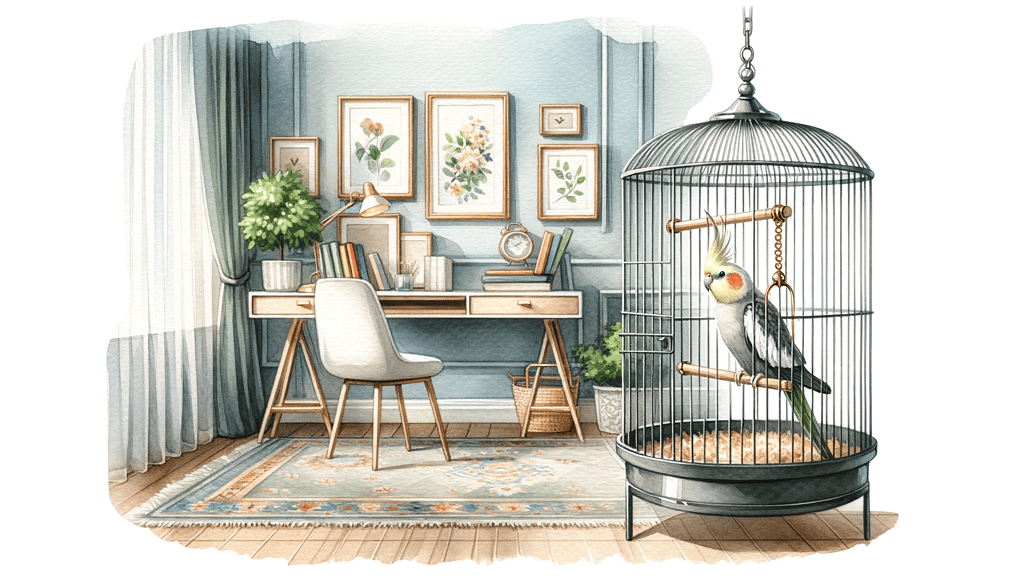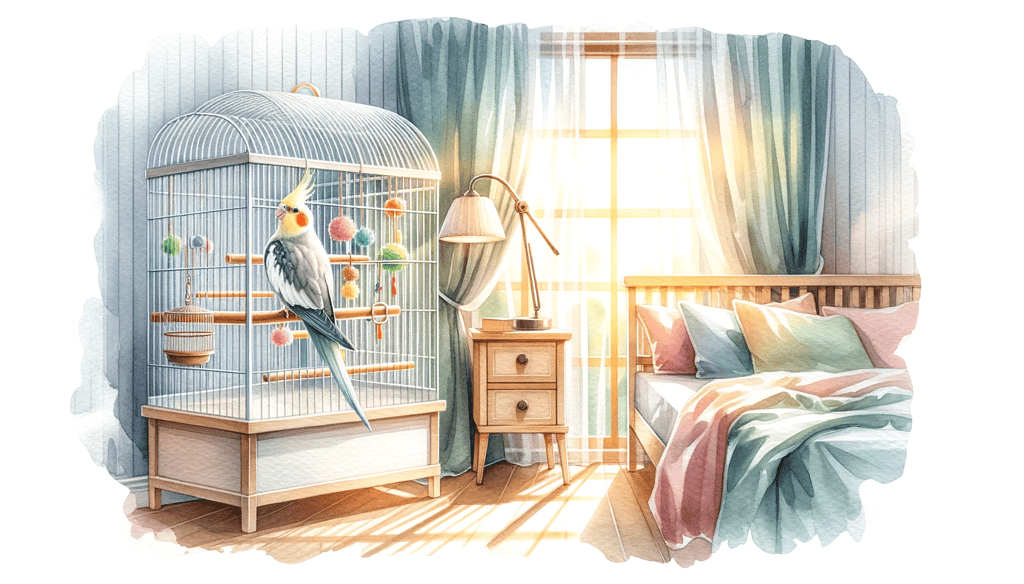
Cockatiels are among the most cherished pet birds, known for their vibrant personalities and melodious chirps. But did you ever stop to think about where your feathered friend feels most at home within your home? Where should you place their cage for optimal comfort and happiness?
As a general rule, the ideal placement for a cockatiel cage is in a location that offers a balance of social interaction, safety, and visual stimulation e.g., a bedroom, living room, or a dedicated bird room. This ensures the bird feels secure, engaged, and remains in good health.
Navigating the nuances of cage placement can be intricate, but fret not. Dive into this comprehensive guide, and let’s explore the best spots and considerations for your cockatiel’s haven.
Why Cage Placement Matters?
A well-placed cage provides a sense of security, allowing your cockatiel to relax and be its chirpy self. When a cage is positioned in a safe spot, it reduces the bird’s stress levels, leading to a happier and healthier life.
Moving to a new environment can be overwhelming for a cockatiel. A thoughtfully placed cage can ease this transition, helping your pet acclimate faster. It’s like giving them the best room in the house, where they can observe, interact, and become a part of the family.
The Ideal Placement for a Cockatiel Cage
As we delve deeper into the specifics of cage placement, it’s essential to understand that every home and every bird is unique. However, some universal guidelines can help ensure your cockatiel feels right at home.
1. At Eye Level and Against a Wall
Placing the cage at eye level allows your cockatiel to interact with its surroundings without feeling threatened. It provides a vantage point from which they can observe the world, fostering curiosity and engagement.
- The Importance of Having at Least One Side of the Cage Against a Wall: A wall offers a sense of security. It’s like having a protective barrier against potential threats. This positioning ensures that your bird won’t feel exposed from all sides, giving them a safe space to retreat to when they want some alone time.
- Ideal Placement in a Corner with Two Walls for Added Security: A corner placement takes the security up a notch. With two walls flanking the cage, your cockatiel gets an added layer of protection, making it the perfect spot for those who are a tad more skittish or new to the household.
2. Avoiding Windows
- Risks of Placing the Cage in Front of a Window: While it might seem like a good idea to give your bird a view, windows can pose several risks. The direct sunlight can cause overheating, and the fluctuating temperatures can be harmful. Moreover, seeing birds outside might stress your cockatiel, making them feel threatened.
- Potential Dangers from Heat, Storms, and Drafts: Apart from the direct sunlight, windows can let in drafts, which are not ideal for your bird’s health. During storms, the loud noises and sights can be terrifying for your cockatiel, leading to undue stress.
3. Living Room or Family Room
- Benefits of These Rooms: The living or family room is often the heart of the home, bustling with activity. Placing your cockatiel’s cage here allows them to be a part of the family’s daily life, fostering social interaction and reducing feelings of isolation.
- Potential Drawbacks and How to Mitigate Them: While these rooms are great for interaction, they can sometimes get too noisy or chaotic, which might overwhelm your bird. It’s essential to ensure that there are quieter times during the day when your cockatiel can rest without disturbances. Also, be mindful of other pets, electronics, and activities that might stress or harm your bird.
4. Bedroom

Considering the bedroom for your cockatiel’s cage? It’s a space that can offer a sense of tranquility and bonding.
- When and Why It Might Be a Good Choice: Bedrooms can provide a serene environment, away from the daily commotion. If you’re aiming to nurture a close bond with your bird, this proximity can be invaluable.
- Considerations for Noise and Sleep: Remember, cockatiels can be lively during the day, chirping and engaging in play. This might interfere with your daytime relaxation or work. Moreover, they need 10-12 hours of undisturbed sleep, so ensuring a peaceful, dark setting during their rest hours is crucial. If your sleep schedule is erratic, this might not be the ideal location.
5. Dedicated Bird Room
If you have the luxury of an extra room, creating a sanctuary solely for your cockatiel can be a delightful experience for both of you.
- The Advantages of Having a Room Solely for Your Cockatiel: This space allows for a controlled environment tailored to your bird’s needs, offering ample room for exploration, play, and flight. It also simplifies cleanliness and hygiene management.
- Precautions to Take: Safety first! Ensure the room is devoid of potential hazards like toxic plants, small ingestible objects, or open windows. Regularly inspect for mold or dampness, which can be detrimental to your bird’s health.
6. Steering Clear of Electrical Appliances
Our homes are brimming with gadgets, but they might not always be bird-friendly.
- Why It’s a Bad Idea to Place the Cage on Top of Appliances Like Fridges: Vibrating appliances can unsettle cockatiels. Persistent vibrations can lead to stress and behavioral issues.
- The Impact of Vibrations and Temperature Fluctuations on Birds: Birds are delicate beings. Regular temperature changes, especially near a fridge’s cooling system, can be harmful. The constant hum or buzz from devices can also be a continuous source of annoyance.
7. Elevated Placement: Why It Matters
Naturally inclined to be tree dwellers, birds feel most secure when elevated. Being closer to the ground makes them feel exposed, contradicting their instinct to perch high, away from potential threats.
Tips on Cage Height and Positioning:
The cage should ideally be at chest level. This allows your cockatiel to survey its environment without feeling endangered. It also promotes easy interaction, ensuring your bird feels more integrated into its surroundings and with you.
8. Sleep requirements
Cockatiels require 10-12 hours of undisturbed sleep each night. It’s essential to place their cage in a location where they won’t be disturbed by late-night activities or early morning routines. A quiet corner of a living room or a dedicated bird room can be ideal.
The Factors Determining Cage Placement
As we delve deeper into the intricacies of cage placement, let’s explore some pivotal factors that can influence your decision.
1. Safety Considerations
- Avoiding Areas with Drafts: Drafts can be harmful to your bird, leading to potential health issues.
- Keeping Away from Direct Sunlight: Prolonged exposure can result in overheating or even heatstroke.
- Protecting from Household Dangers: Be wary of other pets, chemicals, or any other potential threats.
2. The Cockatiel’s Social Nature
- Why It’s Essential for Them to Be Around Family Activities: Cockatiels thrive on social interaction. Being part of family activities ensures they don’t feel isolated.
- Balancing Social Interaction and Quiet Time: While they love company, they also need their moments of peace.
3. Access to Natural Light
- Importance of a Natural Light Cycle for Cockatiels: A consistent light cycle is vital for their overall well-being.
- Best Times for Sunlight Exposure: While they hail from sunnier parts of the world, they do seek shade during peak sun hours. Ensure they have a mix of sunlight and shade.
Conclusion
Finding the perfect spot for my cockatiel’s cage was indeed a learning experience. Every bird, has its own unique preferences and needs. The well-being of our feathered friends is paramount, and ensuring they have a comfortable and safe environment is a responsibility we all share. I’ve seen firsthand the difference a well-placed cage can make in a bird’s demeanor and health.
Did you find this guide helpful? Your feedback is invaluable to me. If this article resonated with you, please consider sharing it with other bird enthusiasts. Let’s ensure every cockatiel has a home where they can thrive and spread their joy.
Frequently Asked Questions
How often should I change my cockatiel’s cage location?
It’s generally not advisable to frequently change your cockatiel’s cage location. Birds thrive on routine and consistency. However, if you notice signs of stress or discomfort, consider evaluating the cage’s position.
Are there any materials or cage types best suited for specific rooms?
Stainless steel cages are durable and easy to clean, making them suitable for most rooms. However, in rooms with higher humidity, like bathrooms or kitchens, ensure the cage is rust-resistant. The cage’s bar spacing should also be appropriate for a cockatiel to prevent them from getting their head stuck.
How do I know if my cockatiel is unhappy with its cage location?
Signs of an unhappy cockatiel include excessive screaming, feather plucking, or a change in eating habits.
Can I place multiple cockatiel cages together?
Yes, you can, but with caution. While cockatiels are social birds, they can also be territorial. Ensure each bird has its own space and monitor their interactions. If you notice any aggressive behavior, it might be best to separate the cages.
